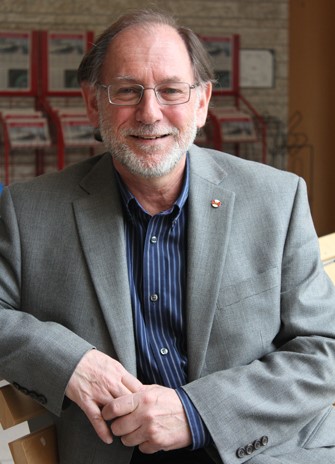
A conference exploring modern Spanish history will take place at the Archives of Ontario at York University’s Keele Campus on Sept. 16 and run alongside a temporary exhibit that features Spanish Civil War-related archive material that includes children’s drawings.
The conference, titled “Modern Spanish History in Global Perspective: A Conference in Honour of Adrian Shubert,” will bring together more than a dozen leading historians from Europe, the U.S. and Canada to reflect on advancements in Spanish historiography over the last 40 years. Scholars will also consider new and emerging directions in the field, especially as they relate to more global perspectives.

Adrian Shubert is a University Professor Emeritus in the Department of History at York University where, over the last 37 years, he taught Spanish, European and global history. He has also served widely in his capacity as an administrator, including as department chair from 1994 to 2000 and as the inaugural associate vice-president international from 2002-09. He is a historian of Spain in the 18th through 20th centuries, and his articles and books have been published in both English and Spanish.
His most recent book is The Sword of Luchan: Baldomero Espartero and the Making of Modern Spain (2021). Shubert has held the prestigious Killam Research Fellowship (Canada) and Guggenheim Fellowship (U.S.); has been elected a Fellow of the Royal Society of Canada; and named Commander of the Order of Civil Merit by King Juan Carlos of Spain.
All are welcome to attend, and those interested can register online.
Topics to be discussed at the conference include:
- Innovations in Modern Spanish History, which will examine new directions and new methodologies in the field;
- Public Histories and Difficult Histories, which will explore the legacies of the dictatorship and public history in Spain and beyond;
- New Directions in Spanish Civil War History, which will focus specifically on how historians are approaching the military conflict in light of digital humanities and other emerging methodologies; and
- Modern Spain and Global History, in which panelists will discuss how historians of modern Spain are situating the nation’s history in larger, global and world historical terms.
The Spanish Civil War (1936-39) is one of the seminal events of Europe’s 20th century history. It mobilized people around the world in unprecedented ways. This included some 1,600 Canadians of the Mackenzie-Papineau Battalion who went to Spain to fight for the Republic, as well as Dr. Norman Bethune, who invented a technique for performing blood transfusions at the front while in Spain – and after whom one of York University’s original colleges is named.
Ultimately, the war gave rise to a brutal dictatorship that lasted until November 1975 and one of whose legacies has been to render that past a “difficult history” that remains a subject of intense public and political controversy even today. This long-lived and repressive regime stifled the study of the nation’s modern history and kept Spanish historians largely isolated from broader historiographical trends and developments.
As a result, much of the formative scholarship of the Second Republic (1931-39) and the Civil War was carried out by foreign scholars, particular in the English-speaking world. This changed in the 1980s as Spanish historians, freed from the constraints of the dictatorship, began to enjoy new-found access to archives and freedom to publish. This generation of scholars brought both an Iberian perspective to the study of modern Spanish history as well as modern historiographical methodologies and practices.
In addition to the renowned assembly of Spanish historians gathered for this conference, York University’s Faculty of Liberal Arts & Professional Studies (LA&PS) Dean J.J. McMurtry will offer welcoming remarks and Alfredo Martínez Serrano, ambassador of Spain to Canada, will speak about the importance of history education and the Spanish embassy’s long history of cooperation with York University dating back to 1998.
“This conference will strengthen the research profile of LA&PS and York University, which has the longest history of teaching modern Spanish history in Canada and the second longest in North America after the University of California, San Diego,” says York University Professor of history Boyd Cothran. “As a leader in the study of history, public history, and various other fields, moreover, the event aligns with the Faculty’s Academic Plan.”
